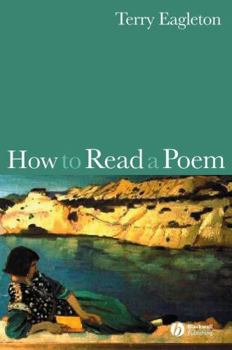How to Read a Poem
Select Format
Select Condition 
Book Overview
Lucid, entertaining and full of insight, How To Read A Poem is designed to banish the intimidation that too often attends the subject of poetry, and in doing so to bring it into the personal possession of the students and the general reader.
Format:Paperback
Language:English
ISBN:1405151412
ISBN13:9781405151412
Release Date:October 2006
Publisher:Wiley-Blackwell
Length:192 Pages
Weight:0.60 lbs.
Dimensions:0.7" x 6.7" x 9.5"
Customer Reviews
3 ratings
Without the clutter, a tour de force of close reading
Published by Thriftbooks.com User , 15 years ago
Eagleton writes well, no one denies that. And he's got some trenchant observations and good analytical skills. But his books do seem to pump out very familiar themes to an Eagleton reader, such as Marxist literary criticism and the Russian Formalists, with very little variations on those themes. And he seems to over-elaborate many sentences and many arguments, fiddling around with a single idea but expressing it in twenty different ways, one after another, swooning with uncertain effects at times. The book is at its most superfluous in the chapter on Russian formalists (chapter 3), which could be amputated painlessly. One could also lop off chapter 1 with little inconvenience, and weed off from Chapter 4 anything other than Eagleton's close readings. What would be left after doing all that is a superb work of applied literary criticism. And some readings ARE superb. He applies finely-tuned reading techniques to a number of poets, and the result is a thrilling encounter with multiple meanings, provocative interpretations, an array of techniques and effects working deftly together. In short, what studying literature is all about. Just for that, How to Read a Poem is worth it. And for brilliant phrases like this one: "In everyday life, talking about imaginary people as though they were real is known as psychosis; in universities, it is known as literary criticism" (p. 22).
Context and Content
Published by Thriftbooks.com User , 17 years ago
I think this may be a book for people who have bought; read and enjoyed poetry beyond the duties of formal education. Terry Eagleton brings so much more to the reading of a poem -and still rings true.
Good guide for the student
Published by Thriftbooks.com User , 18 years ago
In mostly eschewing theoretic jargon, or by giving clear examples to explain the jargon used, Eagleton has written an excellent guide for the academic reader. I stipulate this qualification because the mythical Common Reader would probably be put off by the detailed explanation of such things as the theories of the Russian Formalists and their disciples that take up several chapters. While Eagleton remains a proud card-carrying Theorist (an academic species he feels has been grossly misunderstood), he does the heavy lifting for the reader so, with only a modicum of effort, his arguments can usually be easily followed. All this would be beside the point unless he had some illuminating things to say about the structure of poetry and how to approach the critical reading of a poem. Happily he does, which makes this short volume repay any effort it takes to read. Unlike Harold Bloom, he expects little on faith from the reader and makes the necessary effort to convince you of his points. And although his Marxist sentiments are frequently in evidence, he never becomes heavy-handed and uses his bias more for flavoring than the meal itself. So like many critical guides, what your needs are going in will determine your satisfaction coming out. For the general reader, Stephen Fry's "The Ode Less Travelled" might be a better fit. For the serious student of literature, Mr. Eagleton's guide is a worthwhile investment.






